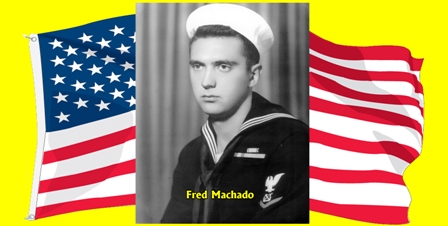|
Fernando C. ”Fred” Machado was born in the Azores Island of Flores on March 4, 1932, in the township of Fajazinha. He was the eldest of seven children; four boys and three girls. Fred and his siblings were all natural born United States citizens. Their father, Joe F. Machado was a U.S. Citizen at the time, living in the Azores. Their mother, Margaret, was a Portuguese citizen at the time, although she became a naturalized U.S. Citizen in 1955. The family returned to the United States in 1949, and his father worked at different dairies throughout the valley for a couple years, before joining Pittsburgh - Des Moines Steel in Fresno, where he retired after 30 years. Fred joined the Navy near the beginning of the Korean War in November, 1950. After boot camp, he was assigned to the USS Montague AKA-98 that had just returned from Korea for repairs. On June 9, 1951, Fred boarded the Montague at the Mare Island Shipyard in Vallejo, California, going through three months of training. The next nine months were spent traveling to the Philippines, Japan, Korea and Hong Kong, landing troops and supplies in and out of Korea. The Montague returned to the U.S. in July, 1952, spending the rest of the year training and transporting Army and Marine personnel. In February, 1953 the Montague was dry docked at the Bremerton, Washington Shipyard for three months repairs. Afterwards the Montague, along with several other ships, proceeded to Hawaii to pick up and replace troops from several beaches; delivering the returning troops to Fort Lewis, Washington. In July, 1953, along with a group of other AKA’s and APA’s, the Montague transported the 3rd Marine Division from San Diego to Yokahama, Japan. After returning to the U.S., they left for the Far East, spending time in Japan, Korea, Okinawa, Hong Kong and Vietnam, participating in “Operation Passage to Freedom”. The Montague, made three trips, evacuating over 6,000 refugees during a period of eleven months. A total of over 300,000 refugees were evacuated during this mission. Fred and his shipmates were very grateful to be Americans, and be aiding such devastated people. The Montague was relieved by another AKA, and returned to the United States via Japan, where Fred was honorably discharged on March 8, 1955. He proudly returned home to Fresno, California. Fred bought his first car, a 1952 Chevy, and took a job milking cows seven days a week. He then drove a milk truck, pitching 150 pound milk cans to the second deck of his truck; again working seven days a week. Not liking that type of work, Fred had the opportunity to rent 25 acres of farm land. He purchased a used tractor, some equipment, and thus began Fred’s career as one of the most successful and respected farm and dairyman in the Central Valley. Fred met his future wife, Maxine Finney, while visiting Mello’s Ice Cream Shop in Fresno. Her brother’s friend Tony, had told him about Maxine, and he had went there to get acquainted. It was love at first sight and they were married February 23, 1957 at Saint Alphonsus Church in Fresno. They have one son, Arthur and two daughters, Kathi and Virginia. Through
the years Fred has served on the board of many agriculture organizations, and
was appointed, by then Governor Ronald Reagan, to serve on the board of the
Big Fresno Fair. For his contributions to agriculture, Fred has been awarded
the Fresno County and the California Farm Bureau Distinguished Service
Awards, California State University Ag One Community Salute, and the Greater
Fresno Chamber of Agriculturist of the Year awards. He continues to belong
and serve as a member of many civic minded clubs, organizations and churches.
Fred
is proud to be an American, a veteran, a farmer, a dairyman and a citizen of
our great country. Nothing is more important to Fred, than his wife of 53 years,
his children, grandchildren, and his farming enterprises. He enjoys the
camaraderie of volunteering with fellow veterans at the Veterans Memorial
Museum, “Home of the Legion of Valor.” |

